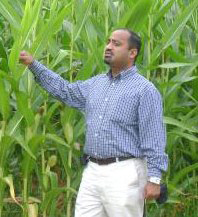 The recent announcement of an $817,000 state grant to develop a biofuels research facility in Harrisburg was lauded by academia and economic developers alike, but perhaps no one was as excited as Dr. Sairam V. Rudrabhatla, a scientist who has been quietly helping to build a biotech sector in Central PA.
The recent announcement of an $817,000 state grant to develop a biofuels research facility in Harrisburg was lauded by academia and economic developers alike, but perhaps no one was as excited as Dr. Sairam V. Rudrabhatla, a scientist who has been quietly helping to build a biotech sector in Central PA.
Rudrabhatla, who teaches at Penn State University’s Harrisburg campus, is the school’s leading biotech researcher, investigating ways to alter biofuel crops to thrive in the state’s climate and produce high yields on land with little agricultural value–like old minefields. He has helped drive interest at the school to become a center of this research, and last month’s grant, available through the state Department of Community and Economic Development’s Alternative and Clean Energy Program, will soon bring to life the $1.6 million Central Pennsylvania Laboratory for Biofuels.
The grant was received on behalf of the Innovation Transfer Network, a consortium of 13 colleges in the Harrisburg-Lancaster area and supporter of Rudrabhatla’s work, and will involve students from up to 21 PA schools. Private industry, led by Ernst Seeds in Meadville, Keystone Biofuels in Shiremanstown and Kunj Associates in Harrisburg, provided $650,000 toward the project The project will consist of a 3,000 square foot biotech development and deployment lab and a specialized 1,500 square foot greenhouse complex.
Rudhabhatla and his group of two dozen students and commercial partners are working with crops like jatropha, an oil-rich plant typically grown in tropical climates, to develop biofuels. With the new center, Rudhabhatla, who has a background working in private industry and agriculture, and his team have a place to plant and grow their work.
Keystone Edge (KE): What motivated you to do this kind of work?
Sairam Rudhabhatla (SR): I come from India and I know what hunger and poverty is in those regions, how many children are dying each and every day. So I’m very passionate, very determined to develop something that can help people. I come from an agricultural background and I’m always very impressed with how people work with agriculture. When gas prices were increasing a few years ago, I knew a number of greenhouse growers in the Toledo, Ohio area who were suffering. I thought I could make a change. Seeing greenhouse growers whose business is hurting, whose crops are dead due to frost, and soon before they know, they’re in debt, that’s how we started our research on producing cold tolerant/disease resistant crops.
KE: How has the idea of a biotech center developed?
SR: There was a very basic biology lab when I came here in the fall of 2007. Our school started getting equipment and I received a few grants. I met with Jennifer Hammaker of the Innovation Transfer Network in 2008. She’s a wonderful person who was very excited to hear about everything we’re working on, and she started to put me into contact with a number of companies in the region.
Our chancellor Madlyn Hanes’ vision and the support of Drs. Mukund Kulkarni and Omid Ansary and the Office of Alumni Developmoent at the right time has made all of this possible. And the other person who’s been very actively involved and enthusiastic is Steve Brawley, the CEO of Ben Franklin Technology Partners of Central and Northern Pennsylvania. And Congressman Tim Holden’s support and visit to our campus in the paste year helped us tremendously.
KE: How will the new center impact student interest in biotech?
SR: There will be more opportunities for students to broaden their experience. When I started here in 2007, students were not aware of biotechnology and how it can influence our everyday liveds. The next year, I had two or three who took my biotech course in the spring. Today I have about 18 students working in my lab. Most of them are not getting paid, just working 20-30 hours per week on a voluntary basis to enrich their skills and be more competitive in the job market. These are the kind of things we want to achieve by introducing new technology. We have to educate the students and open up their minds to the broader opportunities available to them.
KE: What crops seem to be the best-suited for biofuels?
SR: My personal belief is there is no one crop, or solution, so we need to work with multiple crops that can sustain in Pennsylvania and can grow here to produce liquid fuels. We need to have many options if we want to meet the state mandate of 18 percent renewable energy by 2021 and to reduce our dependence on foreign oil. Switchgrass isn’t sufficient alone. Jatropha isn’t alone. Somebody’s working on algae, which is great, and others are working solar. There will be no one solution. Each possibility has its own limitations. For example, we’re working on camelina from the canola family. It’s an excellent plant but the oil content is low so we’re trying to increase it using biotechnology. There’s still a veyr long way to go, like anything else. People have worked on the soybean and corn for more than 30 or 40 years. Everyone’ still learning.
Joe Petrucci is managing editor of Keystone Edge. Send feedback here.
To receive Keystone Edge free every week, click here


